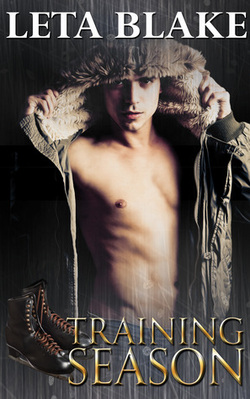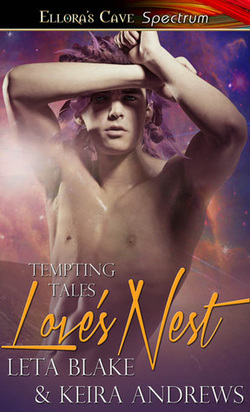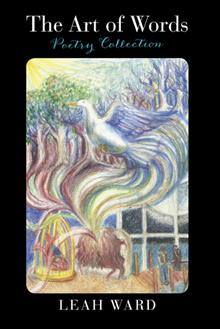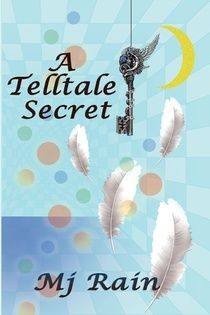

I've been told that it's a deep emotional journey to follow Matty, an elite, male figure skater through his relationship with his sport and his relationship with a man who came into his life at just the right time--or the wrong time, depending on how you look at it. And, well, to my shock and delight, it was in the Top 10 of Amazon's Gay Literature & Fiction Best Sellers for nearly three weeks in December, and has only fallen off the Top 100 of that list in the last week or so. It's garnered rave reviews from many prestigious review sites in the genre and has held an admirably high rating at Goodreads and Amazon from readers, as well. So, apparently, quite a number of people liked it!
Were you inspired to write a novel around the world of figure skating by the recent Winter Olympics, or was it something that had always been in your head?
I wrote the majority of Training Season in 2011, in the year following the last Winter Olympics, actually. But, for various reasons, I'd never taken it all the way. When I realized last August that this year's Winter Games were speeding up on us, I decided to put everything else aside and focus on getting Training Season in shape to be released before the games. So, the fact that the Olympics were coming up did play a part in having the book finished and published when I did.
Your protagonist, Matty Marcus, is quite a strong lead, in that he has an immediate presence on the page and is quite demanding of the reader's attention. Did you take your influence from any real life figure skaters?
Matty took on a life of his own and really grew into a character unlike any of the skaters who helped to inspire him, but aspects of his character were definitely influenced by a amalgam of skaters--Denis Ten, Stefane Lambiel, Adam Rippon, and, of course, the incredibly fabulous Johnny Weir.
Matty and his love interest, Rob, are very different in personality. What is it about the "opposites attract" trope that seems to appeal so much to romance audiences?
I think the trope appeals in real life, too, to a degree. I think that there are certain things that a successful couple needs to have in common, like their value systems about love, sex, respect, and commitment, but there are other things that people in both fiction and real life often do well to have a bit opposite. A chatterbox needs someone to listen to him, while a quiet person needs someone to listen to. A mild introvert might need someone to pull him out of his shell, while an extrovert might need someone to calm and quiet him. In general, I think people respond to the idea of completion in romance. Like that famous line from Jerry Maguire: "You complete me." (There were a lot of famous lines from that movie, weren't there? "You complete me." "Show me the money." "You had me at hello.") People tend to respond to the idea that someone else can come along and, just by being themselves, provide the hero/heroine with a little something they lack, making them a better, more complete person, just by existing in the same room together. It's a nice idea that provokes a warm and fuzzy feeling and a sense that maybe it's possible to be not only accepted, but loved just the way we are, and even because we are the way we are.
This is your first full-length novel without co-author Keira Andrews. Was it a little scary going solo for the first time?
You know, everything with Training Season happened so quickly that I didn't have time to be afraid. I was pretty blithe about it all, quite sure that no one would even notice this book, and I'd be lucky to sell a hundred copies. Then--boom!--people were talking about it, it started climbing the charts, and I spent about a month waiting for someone to call me up and say, "Oh, that was all a really awesome joke we played on you, wasn't it, Leta? You've really sold ten copies." So, I guess, in a way, I'm still trying to understand how this little book that I never thought was going to do anything at all suddenly took off. I haven't even had time to feel frightened that I wasn't writing with Keira!
We're celebrating the UK's LGBT month at I'm With Geek with a series of articles on LGBT literature. What, if anything, made you decide to write about gay male protagonists? Were you concerned about an increase in visibility, or do you simply just enjoy writing male/male romance?
I have several works in progress with heterosexual protagonists, but the majority of my books are somewhere on the LGBT spectrum. I could probably write a tome about the various deep and not-so-deep reasons why I find myself writing gay men and women more often than heterosexual characters, but I think for this answer I'll simply say that I want to write stories I haven't heard a thousand times already, and one way to do that is to put two men in a situation and see how they behave, or two women, or a trans*person and a gay man. I want to read something new that represents the new world I hope we are heralding in where everyone gets their story told. And, yes, that does include heterosexual characters who don't always behave in stereotypical ways, but I also find it easier to break free of gender stereotypes when writing gay or lesbian couples.
There has been a major increase in the LGBT market in the recent years, which may be in part down to the advent of e-readers and the popularity of fanfiction. Is it easier now for LGBT fiction to be accessed by a mass audience, and do you think that audience has always been there?
I think that there has always been a large audience, many of which are represented, as you point out, by fanfiction readers, who are interested in LGBT fiction, yes, but I think that for far too long traditional media has been too afraid to recognize this fact and write books, television shows, and movies toward that audience. I also think that the next generation is bringing a new set of rules to the table, and those rules are so far outside of the traditional view of what acceptable romances or stories look like that the old guard is going to find themselves out on their ear with fewer and fewer consumers for their products.
The romance genre in general has seen a boom, and audiences are much more receptive to more graphic depictions of sexual acts. Did you have any consideration in Training Season, or any of your other books, about how readers would react to the sex scenes?
There were two specific sex scenes in Training Season that I was curious about how readers would receive them. For the most part, they've been well-liked, though a few folks did hate them passionately. In the end, though, I am happy with the scenes in the book and feel that each of them progresses the relationship or otherwise shepherds in important character growth. One reviewer was quick to point out that while they are graphic scenes, they are love scenes, and not just sex-for-sex's-sake scenes, and I agree with that analysis.
I'd say the only other time I give any thought to the graphicness of the sex scenes in my books is when talking to my child's friend's parents about being a writer. I always hesitate to tell them about my books, not because they are gay, but because I live in the Southern United States, a notoriously conservative area, and the graphic sex scenes are sure to inflame some people in ways not passionate or loving. Basically, I worry about speaking too openly about my writing for fear that it will lead to trouble for my daughter in school. I'm sure "your mom writes dirty books!" isn't anything she wants to deal with at her age right now.
You have published three books in your Tempting Tales series with Keira Andrews. Are there any plans to continue with this series, or are you both exploring your own projects at present?
After a disappointing reception in terms of sales (though not in terms of reviews from review sites and the few readers who did pick up the books), we've shelved the project for the time being. Keira is in the midst of trying to make a go at being a full-time author and so spending time on books that weren't bringing in a reasonable amount of money didn't seem to be a very smart way to start out! Haha! We might go back to them at some point, but I feel like we're both better served working on other projects at the moment. They are, we've been told, good books, though, and if gay fairy tales are your thing, I'd definitely suggest checking them out!
Finally, as it is LGBT month, could you share with I'm With Geek some of your favourite LGBT reads?
Oh, absolutely! Where to begin?
As Meat Loves Salt by Maria McCann - absolutely breathtaking and a rival for being one of my all-time favorite books ever written.
Fingersmith by Sarah Waters - after years of reading, it can be hard to surprise me, but this book managed it twice!
The Rifter Series by Ginn Hale - this series took over my mind, ate my brain, and left me feeling like someone had given me the world on a platter...and then jerked it away from me by not being endless.
Candy Everybody Wants by Josh Kilmer-Purcell - this book was absurd in all the best ways, and like all the best absurd things, it's so real beneath the surface of ridiculousness.
Find out more about Leta Blake at her website or her Goodreads page.





 RSS Feed
RSS Feed
